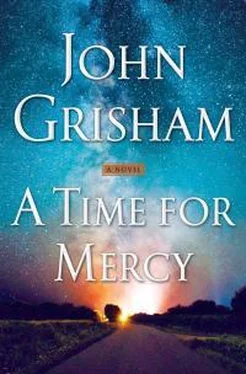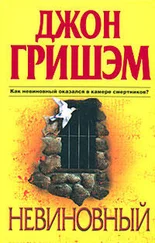“This man just yelled at me,” she said.
“Who was it?”
She put the receiver away, picked up the Tupelo paper, pointed to the black-and-white photo of Stuart Kofer, and said, “Said he was his father. Said his boy got shot yesterday, shot dead, and that you’re the lawyer for the kid who shot him. Talk to me, Jake.”
Jake tossed his briefcase onto a chair. “Earl Kofer?”
“That’s him. Sounded crazy. Said the kid, Drew somebody, didn’t deserve no lawyer, crazy stuff like that. What’s the deal?”
“Have a seat. Is there any coffee?”
“It’s brewing.”
“Noose appointed me to the case yesterday. I met with the kid last night at the jail, so, yes, our little law firm now represents a sixteen-year-old boy who will probably be indicted for capital murder.”
“What about the public defender?”
“He couldn’t defend a bully in kindergarten and everybody, especially Noose, knows it. He called around and couldn’t find anyone else and he thinks I know what I’m doing.”
Portia sat down, tossed the newspaper aside, and said, “I like it. This will really liven up the place. Almost nine o’clock on a Monday morning and we’ve already had our first nasty phone call.”
“There will probably be others.”
“Does Lucien know?”
“I haven’t told him. And Noose is promising that he’ll replace me in thirty days, just wants me to handle the preliminary stuff.”
“Did the boy shoot him?”
“He didn’t talk much. In fact he clammed up and went into a daze. I think he needs some help. Based on what Ozzie said, he shot him once in the head with his own gun.”
“Do you—did you know Kofer?”
“I know all the cops, some better than others. Kofer seemed to be a good guy, a friendly sort. Last month he spoke to Carla’s sixth graders about drugs and she said he was wonderful.”
“Not a bad-lookin’ boy, for a white guy.”
“I’m going to the hospital in about an hour to see the kid’s mother. Looks like Kofer may have knocked her around some before his big moment. You want to go?”
Portia finally smiled and said, “Of course. I’ll get you some coffee.”
“What a good little secretary you are.”
“I’m a paralegal slash research assistant, soon to be law student, and before you know it I’ll be a full-blown partner around here and you’ll be fetching me coffee. One milk, two sugars.”
“I’ll write that down.” Jake climbed the stairs to his office and took off his jacket. He had just settled into his leather swivel when Lucien arrived, before the coffee.
“Heard you got a new case,” he said with a smile as he fell into a chair, one that he still owned because he owned all the other furniture as well as the building itself. Jake’s office, the grandest one, had belonged to Lucien before he was disbarred in 1979, and to his father before he was killed in a plane crash in 1965, and to his grandfather who built the Wilbanks firm into a powerhouse until Lucien took over and ran off all the paying clients.
Jake should have been surprised that Lucien knew, but he wasn’t. Like Harry Rex, Lucien seemed to hear the hottest news first, though both had entirely different sources.
“Noose appointed me,” Jake said. “I didn’t want the case, still don’t.”
“And why not? I need some coffee.”
Usually, on a Monday morning, Lucien did not bother with pushing himself out of bed, showering and shaving, and putting on semi-respectable clothes. Since he couldn’t practice law, his Mondays were normally spent on the porch trying to drink off the weekend’s hangover. The fact that he was awake and fairly presentable meant he wanted details.
“It’s coming,” Jake said. “Who told you?” A worthless question that was never answered.
“Sources, Jake, sources. And why don’t you want the case?”
“Harry Rex is afraid it might somehow damage the Smallwood settlement.”
“What settlement?”
“He thinks they’re getting ready to put money on the table. He also thinks that this killing could damage my stellar reputation as a noted trial lawyer. He thinks the public will turn on me and we won’t be able to pick fair and open-minded jurors.”
“When did Harry Rex become an expert on juries?”
“He thinks he’s an expert on people.”
“I wouldn’t let him in front of my jury.”
“That’s my job. I have the charisma.”
“And the ego, and right now your ego is telling you that you’re far more popular than you really are. Defending this kid will not affect your railroad case.”
“I’m not sure. Harry Rex thinks otherwise.”
“Harry Rex can be stupid.”
“He’s a brilliant lawyer who happens to be my co-counsel in what just might be the biggest case of our struggling careers. You don’t agree with him?”
“I seldom do. Sure, you’ll take some heat for defending an unpopular client, but what the hell? Most of my clients were unpopular, but that didn’t mean they were bad people. I didn’t care what these yokels thought about me or them. I had a job to do and it was completely unrelated to the gossip in the coffee shops and churches. They may talk about you behind your back but when they get in trouble they’ll want a lawyer who knows how to fight, and fight dirty if necessary. When’s the kid going to court?”
“I have no idea, Lucien. I plan to talk to the D.A. and to Judge Noose this morning. There’s also the matter of youth court.”
“Not a youth court matter, not in this backward state.”
“I know the law, Lucien.”
“A charge of murder is automatically excluded from youth court jurisdiction.”
“I know the law, Lucien.”
Portia opened the door and eased in with coffee and cups on a tray.
Lucien continued his lecture. “It really doesn’t matter how young the kid is either. Twenty years ago they put a thirteen-year-old on trial for murder down in Polk County. I knew his defense lawyer.”
“Good morning, Lucien,” Portia said politely as she poured coffee.
“Mornin’,” he said without looking at her. In the early days of her employment he enjoyed long, leering stares. He had touched her a few times, on the arms and shoulders, just little affectionate pats that meant nothing, but after some stern warnings from Jake and a direct threat of bodily harm from Portia, he’d backed off and grown to admire her.
“We had another call, Jake, about five minutes ago,” she said. “Anonymous. Some hick said if you tried to get this boy off like you got that Hailey nigger off, there would be hell to pay.”
“I’m sorry he said that, Portia,” Jake said, stunned.
“It’s okay. I’ve heard it before and I’m sure I’ll hear it again.”
“I’m sorry too, Portia,” Lucien said softly. “Real sorry.”
Jake waved at a wooden chair next to Lucien and she sat down. In unison, they sipped their coffee and thought about the N-word. Twelve years earlier, when Jake finished law school and arrived in Clanton as the rookie, the word was commonly used by white lawyers and judges as they gossiped and told jokes and even did their business without an audience. Now, though, in 1990, its usage was fading and it was deemed improper, even low-class, to use it. Jake’s mother hated the word and had never allowed it, but, growing up in Karaway, Jake knew that his home was different in that respect.
He looked at Portia, who at the moment seemed less bothered than the two men, and said, “I’m really sorry you heard that in this office.”
“Hey, I’m okay. I’ve heard it my entire life. I heard it in the army. I’ll hear it again. I can deal with it, Jake. But, just to clear the air here, all the players involved are white. Right?”
Читать дальше












![Джон Гришэм - Апелляция [Фейк]](/books/403002/dzhon-grishem-apellyaciya-fejk-thumb.webp)